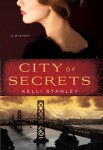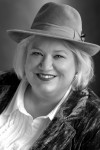City of Secrets by Kelli Stanley
 By Jeff Ayers
By Jeff Ayers
Kelli Stanley is one of the best historical mystery writers in the business. Whether she is writing about ancient Rome or San Francisco at the beginning of the 1940’s, Stanley can immerse the reader in that time. Her latest novel is her second set in SF, CITY OF SECRETS, and a follow up to CITY OF DRAGONS.
I recently had an opportunity to interview Kelli for TheBigThrill:
What sparked the idea for CITY OF SECRETS?
I first heard about the Holocaust when I was a child. Though I’m not Jewish, relatives on my mom’s side (she’s Polish) perished in the camps. I distinctly remember hearing the term “concentration camp” when I was probably three or four.
In high school, I tried to understand the cause, the psychosis behind it, how an entire country could perpetrate such an unimaginable, unspeakable crime. Later, when I was in college and studying in Europe, I traveled to Dachau, and visited the tiny hiding place where Anne Frank spent her tragically short life.
Eventually I discovered that America, too, had its anti-Semites, that we’d not accepted refugee Jewish children, that our own scientists legitimized and popularized the pseudo-science of eugenics and proved to be inspirations for Hitler’s programs of genocide.
While I was researching CITY OF DRAGONS, I came across specific stories of fascists on American soil in the 1930s, extreme right-wing agitators who wrapped themselves up in patriotic names like “The Musketeers” or “The Christian Front”. They preached “America for the Americans”—white, Protestant working and middle class—viciously attacked Roosevelt as a “Communist” or “Socialist”, and, through political pressure, cut funding for education and other WPA programs while stymieing the government from aiding England and France.
In other words, the sort of intolerant, bullying, self-righteous behavior—the kind that leads to everything from ugly, name-calling rhetoric to domestic terrorism, and that ultimately led to the Holocaust—proliferated here during The Great Depression. It was very real, and very frightening.
Given Miranda’s passion for justice and equity, it seemed a natural hook for a novel. The group in the book—The Musketeers—did exist, and was founded in San Francisco in the late 1930s. And the novel gave me a chance to address the very real (and unfortunately, still prevalent) evil of anti-Semitism.
On the lighter side of things, I also enjoyed being able to incorporate other real people from the era … like fan and bubble dancer (and Miranda’s boss) Sally Rand, who makes a cameo appearance.
Did you see your CITY books being a series?
Originally, my idea was to write two books in chronological order, then two prequels, then forward again with two sequels. I still plan to go backward, fill in gaps in Miranda’s life for my readers … her first case (when she solves her boss’ murder), her first major case as a P.I. (the Incubator Babies affair). Right now, though, we’re moving forward. CITY OF SECRETS takes place in May 1940, just a couple of months after CITY OF DRAGONS. The third book—the working title is CITY OF GHOSTS—picks up just a month later, in June.
I absolutely love writing this series … it’s really the story of Miranda Corbie, told through the cases she takes on and the crimes she tries to solve. I hope to write it forever!
What is MEMORY BOOK? What prompted its creation?
Short stories give me a chance to address some of the back story. “Children’s Day”, which was published in the ITW anthology FIRST THRILLS, is the earliest Miranda story available within her chronology. I felt like writing another, in between books, and wanted to also write a short piece as a sort of introduction to Miranda for new readers. That’s how MEMORY BOOK was born.
It opens on September 13, 1940 … and CITY OF SECRETS releases on September 13, 2011. So there’s a synergy there, and it’s a relatively long length (over 10,000 words). I think MEMORY BOOK—which is set entirely on Treasure Island during the 1939 San Francisco World’s Fair—gives new readers a great overview of Miranda’s character, and showcases some of the back story for her fans.
On a personal note, it also helped me deal with a home burglary that I suffered earlier this year. Writing can be very therapeutic!
Could you talk about the different levels of research you need to sort between two totally different eras?
Well, I kind of live in the past, because I’m always researching. The research for the Miranda series is much more immediate … songs I can listen to, movies I can watch, perfumes I can smell. Detail is super, super important. The era is fully documented, alive in people’s minds, and I want it to become even more alive in the pages of my books. I’ve changed passages to reflect the accuracy of the weather.
When I write something set in the Roman era, it’s a matter of breaking out a lot of history books, looking up historical detail, but the detail, often, is much more like educated conjecture. We don’t have photographs to check, weather patterns to follow, Vogue magazines for monthly fashions. The culture is very familiar to me, because I spent so long in graduate school … rather like an intense immersion course. You just know it. But, because it is so remote—and because things actually changed very, very slowly—the specifics are not as intensely time-consuming to research.
Which series do you have more fun writing?
I don’t want to make a choice here. I really enjoy writing both, but let’s say I’m more comfortable emotionally in Miranda’s world than I am in Roman Britain. I’d always choose to live in the era with indoor plumbing!
Do you have input into your covers?
Most authors, I think, get some input into their covers. For CITY OF DRAGONS, my editor solicited ideas from me, and we had a good talk about what we’d like. CITY OF SECRETS sort of follows the blueprint set up with the first book, and I find both covers very arresting, beautiful and complementary. I love the color schemes, in particular.
With “Memory Book”, the blueprint expands yet again into that luscious purple color … I also really love the fact that the three covers highlight three different women. Later this year I’ll probably run a contest for readers to pick the characters they think the covers represent.
I think I’ve been very, very lucky with my cover designs and designers, and I really applaud the team at St. Martin’s Press—they’re awesome!!
What is your writing process? What steps do you follow to insure the quality level of your work stays so high?
Pain. (laughs). Pain is my writing process! Seriously, I will beat my head into the ground if I can’t get a scene or a chapter right. I write from front to back, beginning to end, with a loose outline … but with complete ignorance of what is actually going to happen. I’m usually surprised.
The pain comes in when I know something’s not working. I can’t really go forward unless I’m satisfied with what I have, because I write so organically, one scene building directly on another. I live Miranda’s life right along with her (though without the cigarettes and much of the bourbon), so it’s a very linear, up close, visceral process. Much like acting—which was my first love.
And thank you for the compliment … I always try to write the best book I can possibly write. Miranda will let me do nothing less!
What’s next?
I’m writing the third Miranda book, which opens about a month after CITY OF SECRETS. Not to give anything away in CITY OF SECRETS, but certain developments in Miranda’s personal life lead directly to her next case.
I plan to write some short stories as a break, including an Arcturus short story early next year. I’m also working on a contemporary thriller, and an idea for a YA novel. Yeah, I’ve got a lot of people in my head who want to get out, but Miranda always comes first!
I would like to give a big thanks to ITW for all the support … I’m proud and honored to have been one of the first ITW Debut Authors, and am continually amazed at all the wonderful things the organization does for its members.
*****
 Kelli Stanley is an award-winning author of crime fiction and noir (novels and short stories), including the critically-acclaimed Miranda Corbie series, set in 1940 San Francisco. CITY OF DRAGONS, the first of the series, was a 2011 Los Angeles Times Book Prize finalist; CITY OF SECRETS will be published September 13th, 2011. Kelli earned a Master’s Degree in Classics, and also writes a historical “Roman noir” series set in first century Roman Britain (THE CURSE-MAKER).
Kelli Stanley is an award-winning author of crime fiction and noir (novels and short stories), including the critically-acclaimed Miranda Corbie series, set in 1940 San Francisco. CITY OF DRAGONS, the first of the series, was a 2011 Los Angeles Times Book Prize finalist; CITY OF SECRETS will be published September 13th, 2011. Kelli earned a Master’s Degree in Classics, and also writes a historical “Roman noir” series set in first century Roman Britain (THE CURSE-MAKER).
You can learn more about Kelli and the worlds she creates on her website.
- Forsaken by Ken Newman - January 31, 2016
- Powerless by Tim Washburn - December 31, 2015
- Syren’s Song by Claude Berube - November 30, 2015
